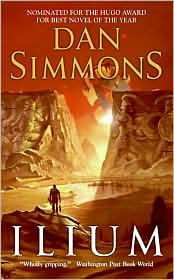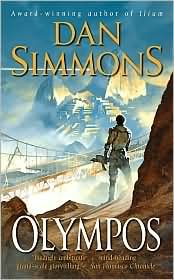Trojan Lore
Posted on | June 5, 2008 at 6:54 am | 2 Comments
Back when I was on the Cancun vacation, I finally finished reading the novel Olympos by Dan Simmons, after a few false starts and a couple of years. Since I read very few books at all these day, that was a major accomplishment. It’s a large book. Olympos is the sequel (actually the second half) to the science fiction epic Ilium. I read Ilium a few years ago precisely because I saw a review of Olympos when it first came out. Even though the review was somewhat negative, it made me interested in the series. Ilium was a really good read; Olympos not so much, unfortunately.

Ilium follows three major plotlines that seem separate but start to mingle towards the end. The first is about these pesudo-Greek gods on the planet Mars recreating the Trojan War, which is monitored by an old human scholar that they’ve resurrected for that purpose. His job is to note where the war re-creation diverges from Homer’s Iliad. The second plotline is about a group of lazy, decadent humans on Earth who have forgotten how to use their technology and are waited on hand and foot. Predictably, the life they know is shattered and they have to learn to be independent and fight for their lives. The third plotline follows a group of robots out in the moons of Jupiter who detect something weird going on back on Earth which they decide to investigate. The narrative for that plotline is mostly through two very different robot friends who spend their time arguing about the merits of Shakespeare vs Proust. Also predictably, the robots are the most human characters in the book, at least in the beginning.
Ilium is rousing high adventure with plot twists galore. It starts off a little slow but becomes a page-turner after a short time. There comes a point where the scholar tasked with observing the neo-Trojan War decides to take matters into his own hands and change the outcome. That’s where the story really starts to get interesting. There are some great character arcs and it’s fun seeing how all the various plotlines eventually touch upon each other. The only problem I had with it is the constant literary references, which is a Simmons trademark (I also read Hyperion and its sequel). I could do with a little less of the robots discussing their literary heroes and a little more action. And though I enjoyed reading the Iliad when I was in college, there’s only so much I can take of the endless lists of soldiers and who they’re fighting and how they died. There’s enough characters in the book without trying to remember who Greek soldier #64 was and what he did to Trojan #213. But luckily, that doesn’t take up too much of the book either.
 The book ends on some cliffhangers, so I was really anxious to start the sequel right after it. I even bought the hardback of Olympos, which was the only edition out at the time (followed shortly by the ebook). But sadly, the conclusion didn’t live up to the build-up. I’m not even sure exactly why, as it wasn’t that different from the first book. There was still a lot of high adventure and action. People were put in jeopardy all the time, only to be rescued at the last minute. There were still a lot of literary references (chiefly, characters from Shakespeare’s The Tempest take center stage for much of the book), but that didn’t get too out of hand. I didn’t particularly like the explanation for everything that was going on, as I felt it was a bit of a copout, and it was something I’d seen too often in other SF books (Xenocide by Orson Scott Card comes to mind, as does Heinlein’s Number of the Beast and the last book or two in Farmer’s Riverworld series). Plus, it got to be very confusing with who was doing what where and the multiple realities and timelines and everything. In fact, I’m pretty sure there was one plot point involving those multiple realities/times that didn’t make any sense at all. When you have such a high concept story like this, it probably doesn’t make much sense to say that some of it was too preposterous, but that’s still what I felt at times. A narrative still has to be consistent within itself, but I felt it violated its own rules at times. The story ended pretty definitely, but still left some unanswered questions and some foreshadowing for another possible sequel.
The book ends on some cliffhangers, so I was really anxious to start the sequel right after it. I even bought the hardback of Olympos, which was the only edition out at the time (followed shortly by the ebook). But sadly, the conclusion didn’t live up to the build-up. I’m not even sure exactly why, as it wasn’t that different from the first book. There was still a lot of high adventure and action. People were put in jeopardy all the time, only to be rescued at the last minute. There were still a lot of literary references (chiefly, characters from Shakespeare’s The Tempest take center stage for much of the book), but that didn’t get too out of hand. I didn’t particularly like the explanation for everything that was going on, as I felt it was a bit of a copout, and it was something I’d seen too often in other SF books (Xenocide by Orson Scott Card comes to mind, as does Heinlein’s Number of the Beast and the last book or two in Farmer’s Riverworld series). Plus, it got to be very confusing with who was doing what where and the multiple realities and timelines and everything. In fact, I’m pretty sure there was one plot point involving those multiple realities/times that didn’t make any sense at all. When you have such a high concept story like this, it probably doesn’t make much sense to say that some of it was too preposterous, but that’s still what I felt at times. A narrative still has to be consistent within itself, but I felt it violated its own rules at times. The story ended pretty definitely, but still left some unanswered questions and some foreshadowing for another possible sequel.
I don’t want to tell people to not read Ilium just because Olympos isn’t nearly as good, because I think everyone should read Ilium. But if you read Ilium, you pretty much have to read Olympos to see how it all plays out. Just prepare to be disappointed.
Latre.
Comments
2 Responses to “Trojan Lore”
June 6th, 2008 @ 4:08 am
I’ve still never made it through the sequel to Hyperion, so it may be a while.
June 7th, 2008 @ 11:01 pm
I’m not entirely sure that I made it through The Fall Of Hyperion either, as I can’t remember anything about it. But with my alcohol-damaged brain cells, that’s not surprising.